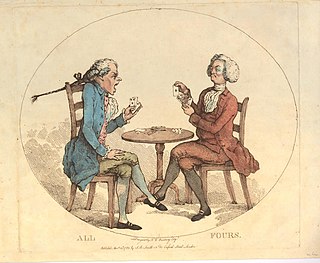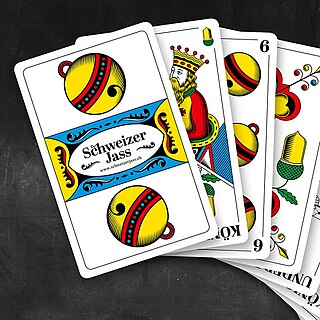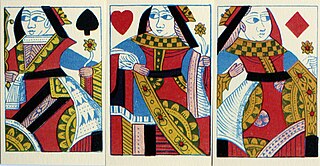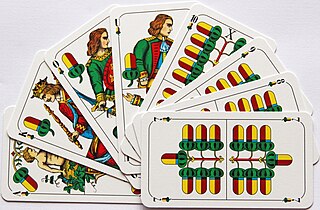
All Fours is a traditional English card game, once popular in pubs and taverns as well as among the gentry, that flourished as a gambling game until the end of the 19th century. It is a trick-taking card game that was originally designed for two players, but developed variants for more players. According to Cotton, the game originated in Kent, but spread to the whole of England and eventually abroad. It is the eponymous and earliest recorded game of a family that flourished most in 19th century North America and whose progeny include Pitch, Pedro and Cinch, games that even competed with Poker and Euchre. Nowadays the original game is especially popular in Trinidad and Tobago, but regional variants have also survived in England. The game's "great mark of distinction" is that it gave the name 'Jack' to the card previously known as the Knave.

Euchre or eucre is a trick-taking card game commonly played in Australia, Canada, New Zealand, Great Britain, and the United States. It is played with a deck of 24, 28, or 32 standard playing cards. Normally there are four players, two on each team, although there are variations that range from two to nine players.

Spades is a trick-taking card game devised in the United States in the 1930s. It can be played as either a partnership or solo/"cutthroat" game. The object is to take the number of tricks that were bid before play of the hand began. Spades is a descendant of the Whist family of card games, which also includes Bridge, Hearts, and Oh Hell. Its major difference as compared to other Whist variants is that, instead of trump being decided by the highest bidder or at random, the Spade suit always trumps, hence the name.

Forty-fives is a trick-taking card game that originated in Ireland. The game is popular in many communities throughout Atlantic Canada as well as the Gaspé Coast in Québec. Forty-fives is also played in parts of Massachusetts and southern New Hampshire in New England, United States, as well as in the South Island of New Zealand.

Ombre or l'Hombre is a fast-moving seventeenth-century trick-taking card game for three players.
Bourré is a trick-taking gambling card game primarily played in the Acadiana region of Louisiana in the United States of America. It is also played in the Greek island of Psara, with the name Boureki. The game's closest relatives are probably Spades and Euchre; like many regional games, Bourré sports many variant rules for both gameplay and betting considerations.
Pedreaux is an American trick-taking card game of the All Fours family based on Auction Pitch. Its most popular variant is known as Cinch, Double Pedro or High Five. Developed in Denver, Colorado, in the 1880s, it was soon regarded as the most important member of the All Fours family. Although it went out of fashion with the rise of Auction Bridge, it is still widely played on the western coast of the United States and in its southern states, being the dominant game in some locations in Louisiana. Forms of the game have been reported from Nicaragua, the Azores, Italy and Finland. The game is primarily played by four players in fixed partnerships, but can also be played by 2–6 individual players.

Bid whist is a partnership trick-taking variant of the classic card game whist. As indicated by the name, bid whist adds a bidding element to the game that is not present in classic whist. Bid whist, along with spades, remains popular particularly in U.S. military culture and a tradition in African-American culture.
Pitch is an American trick-taking card game derived from the English game of All Fours. Historically, Pitch started as "Blind All Fours", a very simple All Fours variant that is still played in England as a pub game. The modern game involving a bidding phase and setting back a party's score if the bid is not reached came up in the middle of the 19th century and is more precisely known as Auction Pitch or Setback. Whereas All Fours started as a two-player game, Pitch is most popular for three to five players. Four can play individually or in fixed partnerships, depending in part on regional preferences. Auction Pitch is played in numerous variations that vary the deck used, provide methods for improving players hands, or expand the scoring system. Some of these variants gave rise to a new game known as Pedro or Cinch.

Jass is a trick taking, Ace-Ten card game and a distinctive branch of the Marriage family. It is popular throughout the Alemannic German-speaking area of Europe (German-speaking Switzerland, Liechtenstein, Alsace part of France, Vorarlberg province of Austria, southwestern Germany, as well as in Romansh-speaking Graubünden and the French-speaking area of Switzerland, German-speaking South Tyrol in Italy, and in a couple of places in Wisconsin, USA and Tuscarawas County, Ohio, USA.
Cinch, also known as Double Pedro or High Five, is an American trick-taking card game derived from Pitch via Pedro. Developed in Denver, Colorado in the 1880s, it was soon regarded as the most important member of the All Fours family but went out of fashion with the rise of Auction Bridge. The game is primarily played by 4 players in fixed partnerships, but can also be played by 2–6 individual players.

Brisca is a popular Spanish card game played by two teams of four with a 40-card Spanish-suited pack or two teams of six using a 48-card pack.
Shelem, also called Rok or similar, is an Iranian trick-taking card game with four players in two partnerships, bidding and competing against each other. It is similar to Spades and Hokm, but bidding and trump are declared in every hand by the bidding winner. Both the name and the point structure of this game are similar to the American game Rook, there being a possible connection between the two games, although it is not clear as from which game it derives.
Smear is a North-American trick-taking card game of the All Fours group, and a variant of Pitch (Setback). Several slightly different versions are played in the Upper Peninsula of Michigan, Minnesota, Northern and Central Iowa, Wisconsin and also in Ontario, Canada.

Klaberjass or Bela is a trick-taking Ace-Ten card game that is most popular in German communities. In its basic form it is a 9-card trick-and-draw game for two players using a 32-card piquet pack.

The following is a glossary of terms used in card games. Besides the terms listed here, there are thousands of common and uncommon slang terms. Terms in this glossary should not be game-specific, but apply to a wide range of card games. For glossaries that relate primarily to one game or family of similar games, see Game-specific glossaries.

Gleek is an English card game for three persons. It is played with a 44-card pack and was popular from the 16th century through the 18th century.

Bavarian Tarock or, often, just Tarock, is a card game played in Bavaria and several regions of Austria as well as in Berlin. The name is a clue to its origin as an attempt to design a game resembling Tapp Tarock but without using a Tarock pack. The original form of Bavarian Tarock thus incorporated several elements of the true Tarock games, whilst being played with a 36-card German deck. However, during the last century, the variant played with a pot (Haferl) and often known as Haferltarock, has evolved into "quite a fine game" that, however, has less in common with its Tarock progenitor. It is descended from Tapp Tarock via the very similar game of Tapp, played in Württemberg, and is thus related to Bauerntarock, Frog and Dobbm. It should not be confused with Königrufen, also known as Austrian Tarock or just Tarock.

Tapp is a trick-taking, card game for 3 or 4 players using 36 French-suited cards that originates from the south German state of Württemberg. It is probably very old. Earlier versions were also known as German Tarock, Württemberg Tarock, Solo or Sans Prendre and may have originated from an attempt to play Tapp Tarock with a standard pack of, initially, Württemberg pattern cards. It is one of a family of similar games that include Bavarian Tarock, the Austrian games of Bauerntarock and Dobbm, and the American game of Frog. Although probably first played in the early nineteenth century, the game of Tapp is still a local pastime in its native Württemberg.

Solo 66 is a trick-taking, Ace-Ten, card game for five players in which a soloist always plays against the other four. It is based on the rules of Germany's national game, Skat, and is played with a French-suited Skat pack of 32 cards. Bidding is for the trump suit. Jacks are ranked within their respective suits and do not form additional trumps over and above the cards of the trump suit. Grupp describes it as "an entertaining game for a larger group."












